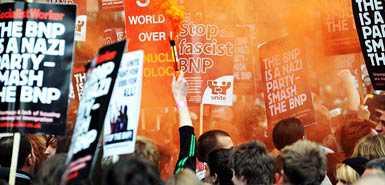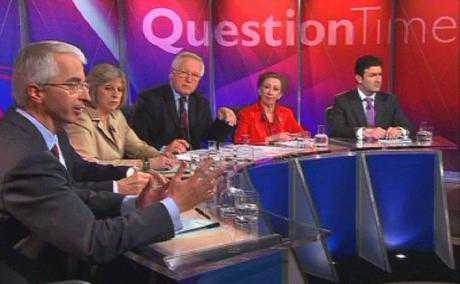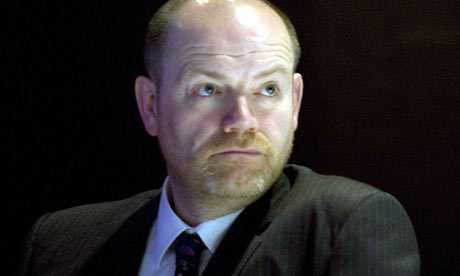The BBC was under siege last night after the leader of the BNP used his appearance on Question Time to attack Muslims and homosexuals while defending the Ku Klux Klan.
By Robert Winnett and Rosa Prince
 Nick Griffin said Islam was not compatible with life in Britain, while describing homosexuals as “creepy”.
Nick Griffin said Islam was not compatible with life in Britain, while describing homosexuals as “creepy”.
However, he admitted sharing a platform with the Ku Klux Klan, which has carried out racist attacks across America’s Deep South, and defended leaders in the organisation as “non-violent”.
The remarks provoked indignation from other members of the BBC panel and hostile parts of the audience, some of whom booed, calling him “a disgrace”.
The BNP leader said he could not explain for legal reasons why he had previously sought to play down the Holocaust and had now changed his mind. He was challenged by Jack Straw, the Justice Secretary and a fellow panellist, who said there was no such law.
Mr Griffin defended his use of Sir Winston Churchill on BNP literature on the basis that his father had fought in the Second World War. He claimed that Churchill would have been a member of the BNP and was “Islamophobic” by “today’s standard”.
Asked whether he denied that millions of Jews and other minorities had been killed by the Nazis, Mr Griffin would only reply: “I do not have a conviction for Holocaust denial.”
He was then chastised by David Dimbleby, the host of the programme, for smiling.
The controversial statements were made in response to intense questioning by members of the audience from ethnic minorities.
BBC Television Centre in west London came under siege as filming took place, with MPs joining hundreds of protesters behind lines of police. There were six arrests as dozens of protesters attempted to storm the studio.
BBC studios in Hull, Scotland and Wales were also targeted by demonstrators. The cost of the police operation was estimated to have been more than £100,000.
The BBC was certain to be questioned over why it allowed Mr Griffin to air such controversial views but executives were hoping that the intensive questioning that he faced would justify their decision to invite him on the Question Time panel for the first time.
The BBC, which Mr Griffin denounced on the programme as “ultra-Leftist”, had claimed that impartiality rules meant that it had little choice but to invite him on to the programme after the BNP won seats in the European Parliament in elections this year.
He was joined on the panel by Mr Straw, Baroness Warsi, the Tory spokesman on community cohesion, Chris Huhne, the Liberal Democrats’ home affairs spokesman, and Bonnie Greer, a black American playwright.
Mr Griffin was seated next to Miss Greer.
One of the most controversial moments came when Mr Dimbleby asked the BNP leader why he had been pictured with David Duke, the former leader of the Klan. Mr Griffin claimed that parts of the racist group, officially classed as a “hate organisation” in America, were “non-violent”.
However, he insisted: “I’m not a Nazi and never have been.” He claimed that he was “the most loathed man in Britain” among British fascists.
He was questioned over his views on Islam and said it had “good points” but “does not fit in with the fundamental values of British society”.
He described white Britons as “aboriginals here”. “The indigenous people of these islands, the English, the Scots, the Irish, the Welsh, the people who have been here for the last 17,000 years, are the aboriginals. The majority of British people are descended from people who have been here since time immemorial.
“You people wouldn’t allow us to have our name on the census form — that’s racism.”
Amid angry scenes, one Asian member of the audience asked Mr Griffin where he would like him to be sent, and added: “You’d be surprised how many people would have a whip round to buy you and your supporters a ticket to go to the South Pole — that’s a colourless landscape, it’ll suit you fine.”
Questioned over whether he believed that British people had suffered genocide at the hands of successive governments, Mr Griffin said: “That is the case. It’s about destroying a culture.”
On the subject of homosexuality he said “a lot of people find the sight of two men kissing in public really creepy”. “That is how a lot of us feel, a lot of Christians, a lot of Muslims,” he said. “I don’t know why, that’s just the way it is.”
Speaking after filming had finished, Mr Griffin claimed that he had been able to “land some punches” and acknowledged that his appearance would “polarise normal opinion” but expressed confidence that it would have an impact.
“A huge swath of British people will remember some of the things I said and say to themselves they’ve never heard anyone on Question Time say that before,” he said. “Millions of people will think, ‘That man speaks what I feel.’ ”
About one million people voted for the BNP at the European elections, leading to Mr Griffin taking up one of its two seats in the European Parliament. As a result, the BBC said impartiality rules effectively forced it to include the party in Question Time.
Mark Thompson, the director-general, said the Government should ban the BNP if it felt that Mr Griffin should not have been allowed to take part in the broadcast.
“If there is a case for censorship, it should be decided in Parliament,” he said. “Political censorship cannot be outsourced to the BBC or anyone else.”
He said the BNP had “demonstrated a level of support that would normally lead to an occasional invitation to join the panel on Question Time”.
Politicians from minor parties, including George Galloway, the Respect MP, and Caroline Lucas, the leader of the Green party, regularly appeared on Question Time.
Mr Thompson insisted that Mr Griffin had been invited so that the public could challenge his views, rather than any “misguided desire to be controversial”.
Speaking before the programme, Gordon Brown said the BNP’s appearance was a matter for the BBC and that he was confident that Mr Griffin would be exposed for his “unacceptable” views.
“I hope that the exposure of the BNP will make people see what they are really like,” the Prime Minister said.
However, there were fears that Mr Griffin’s appearance would lead to an increase in support. He had said he was hopeful his party would be propelled into “the big time” as a result of the broadcast.
The Telegraph






 Peter Galbraith says his business activities took place only when he was working in the private sector.
Peter Galbraith says his business activities took place only when he was working in the private sector.